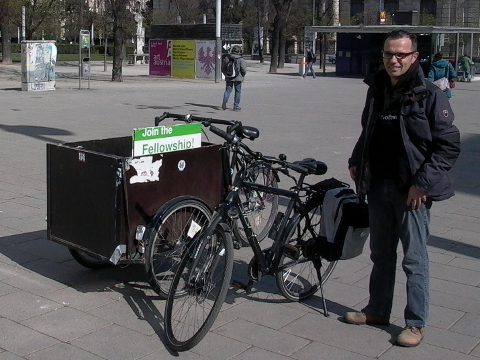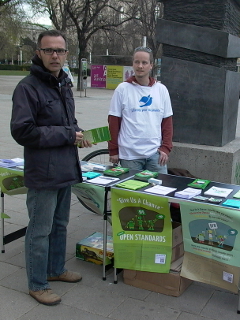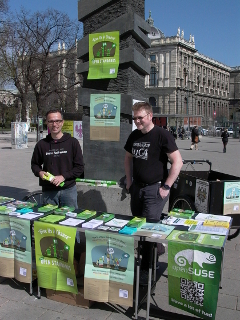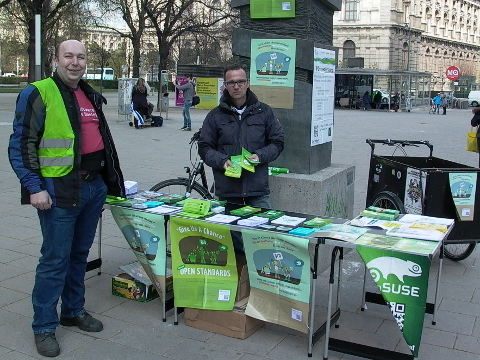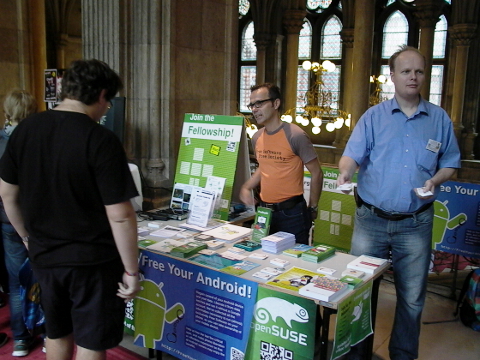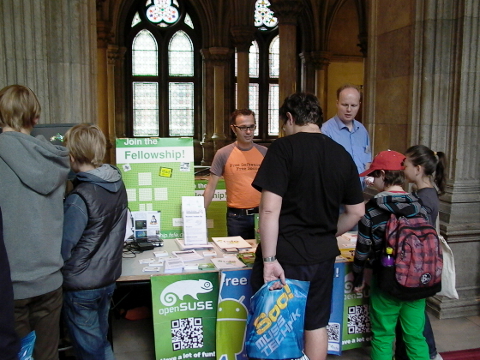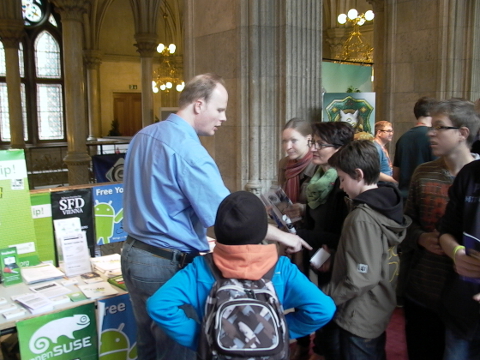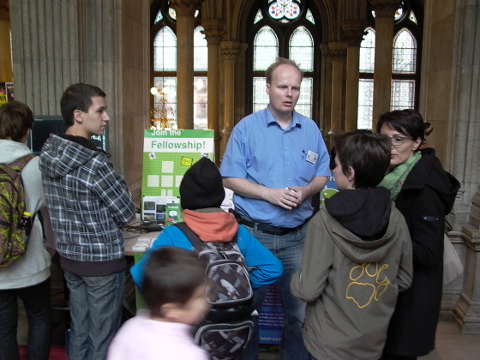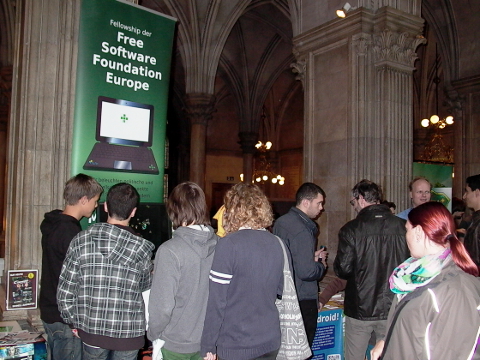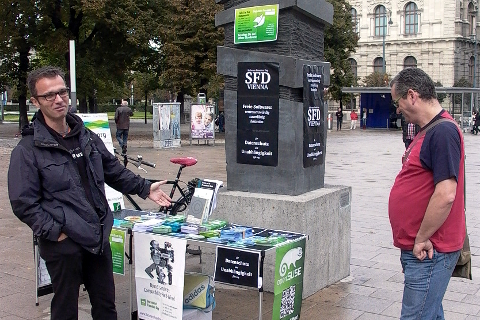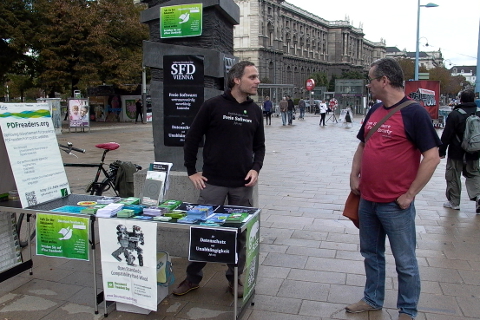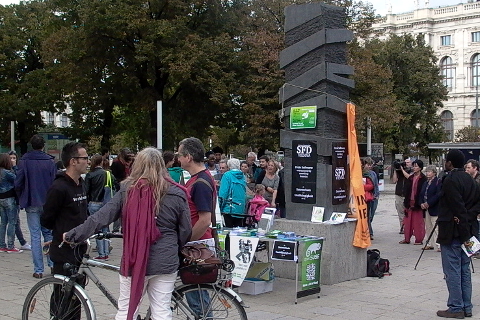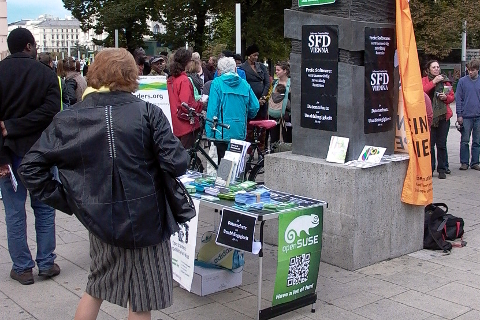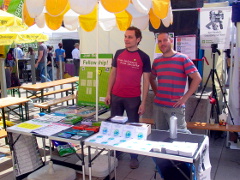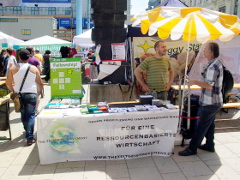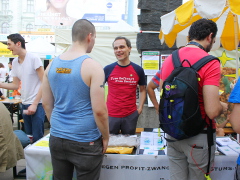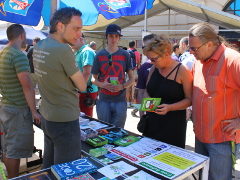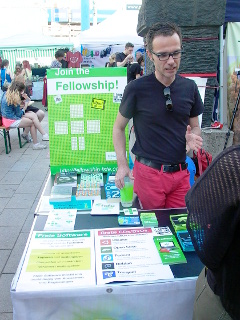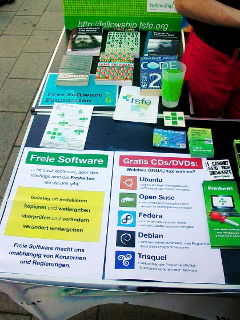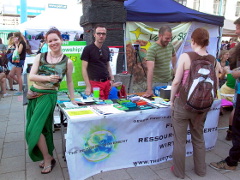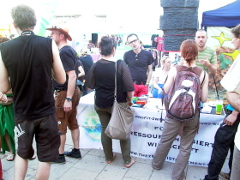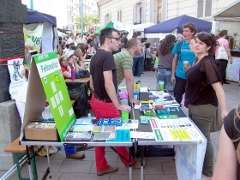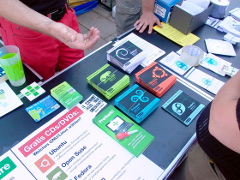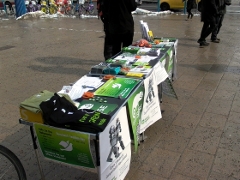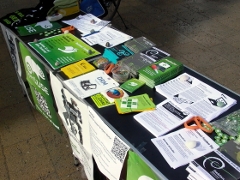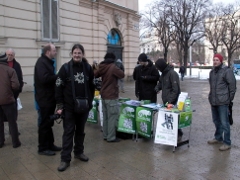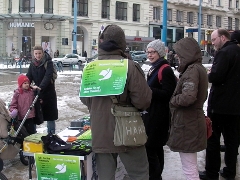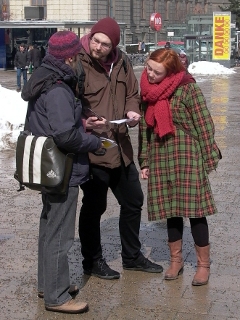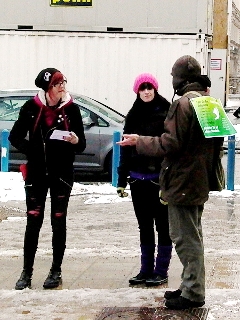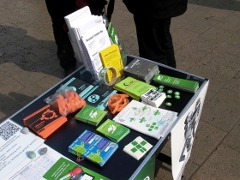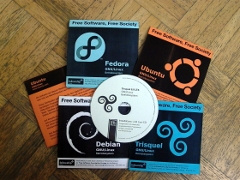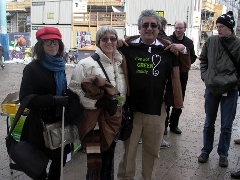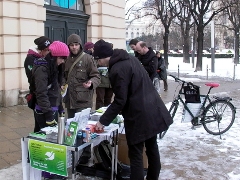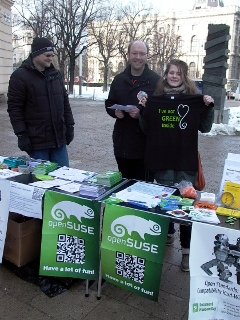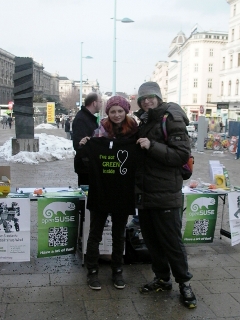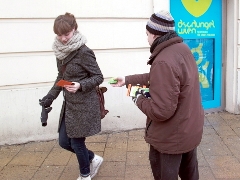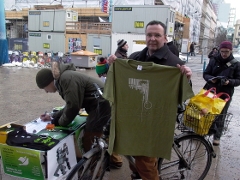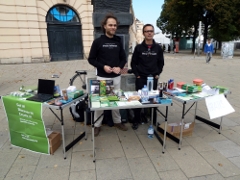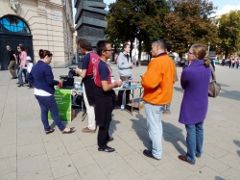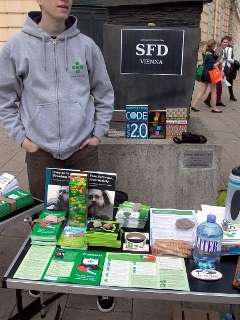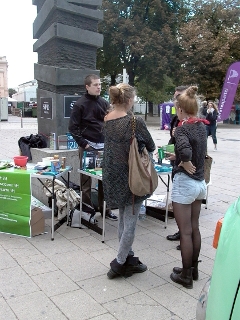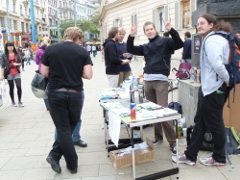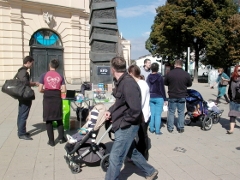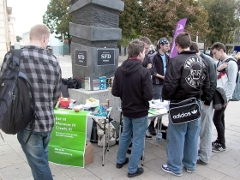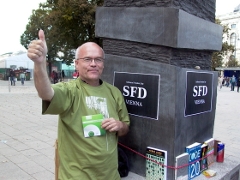How to finance content creation
Today, only very few musicians can feed themselves with what they earn from their work. The great majority has to make an income some other way. Collecting societies don’t help here – even if they make a lot of profit and limit seriously what signed up artists are allowed to do.
In my view, the main problem with charging for information (music, art, news, etc.) today is not even the the fact that it doesn’t work reliable. My main concern is that you can only charge for information if you artificially limit access.
The Good times
In the past, selling media was the most sensible and comfortable way to make a wide range of information accessible to the public. Selling tapes and discs was liberating because it made content available. Back then it was a really good thing and in the public interest to provide such media.
Today, we do not need tapes or discs any more. Content is available via Internet instantly 24/7. Everybody can access, copy and store huge amounts of data without noteworthy financial burden. If you publish something, it’s just out there. Content providers don’t need to make costly copies and expensive deliveries any more. Everybody can copy and share content world-wide almost for free. We don’t need any external service for that any more. Nobody needs to invest a lot to get access or to share. This is an amazing new opportunity. Great ideas can spread very fast without the traditionally costly and painful burden of getting it delivered to everyone interested in it. Through technology we are much more independent nowadays.
A problem
Sounds like a win-win situation, doesn’t it? Here comes the problem: Copying and delivering didn’t cost that much lately. It was very good business selling media, since the only large expense was a fixed price: content creation. All other costs were quite low. The more copies you sold, the smaller the production cost part on every single copy was. We were prepared to buy even quite overpriced copies since it didn’t make any difference for us if we alone or many others bought it. The value for us as individuals stays more or less the same. But selling as many copies as possible is quite important to the suppliers. It defines their financial gain more than anything else. When every day personal computers began to enable us to make our own copies, we discovered that expensive official copies didn’t offer any advantage over our much cheaper personal copies.
But, if nobody needs official copies any more who is going to pay for the production? Even if you don’t invest anything in spreading the final content: the production costs stick.
If we insist on selling content to generate income, this undeniably causes a financial problem in this setting. You can’t sell access if everybody has access by default. Therefore, as a precondition for selling access you need to actively block access for all people but those who pay. This is what DRM does. You are not paying for content, you are paying for not being actively denied access. DRM is much more like blackmailing, than like paying for a service you want. You practically pay for not being denied your freedom to use up-to-date technology. Why should we allow anybody to charge us something for not standing in our way? We do not need a service to defect our devices. We just want access. And today, after something is published, access is just a given.
Clueless?
Are we really that devoid of ideas? Is it really necessary to cripple our technical development just because we are not prepared to finance content creators some other way? It’s like the whole industry lives in denial and presses us all for money. We shouldn’t support a business model which forces us to cripple our technology and to fall short of what we could do with it.
In my opinion it’s just not a valid option to carry on as if technology hasn’t changed. We need to face it: It’s not like it was before. We should embrace and develop great technologies like file sharing instead of standing in our own way.
I don’t have all the answers, but I can clearly see that there is no need for selling content any more. That was yesterday. We need to finance content creators through other means.
A chance
The best alternative concept I have seen so far is the possibility to directly support projects, artists and other content creators work, for example, via crowd funding. This is viable because nowadays we have the technology to connect with them directly. We, as a society, are not yet used to it, but I’m confident we will learn soon enough once the outdated financing model gets out of the way. We need to get rid of DRM.
Of course this new way has consequences. Not all of them are good for everyone. If we suggest direct crowd funding as the main approach for content creators, they would have to do their own fund raising. Only a few would be happy and/or successful in doing this. Most creative people for sure would prefer to outsource this task. But only those with an already sustaining income could contract someone else for helping out with fund raising. Newcomers would have a hard time in this regard. Just like right now.
I see some promising developments like Jamendo for example already. It’s like Lawrence Lessig describes the history of technology development and content industry in his books. For instance, when radio technology threatened the huge music labels through broadcasting. People started to listen to the radio instead of buying records. The labels charged more and more for broadcasting. At some point it was just too much. Radio stations stopped playing expensive songs from famous artists who had contracts with those labels. Instead they started to play songs from other artists not represented by those labels.
As in the past, a new scene is growing today outside the established structures. Sharing content freely is the emerging new way. I’m confident that old timers need to adapt or they will vanish. The most prominent example of a successful musician heading this way is probably Amanda Palmer.
Strange laws
In Austria, we are charged double the amount for empty media than they are in Germany. The content industry has obviously convinced our politicians to collect this absurdly huge tax which goes to collecting societies. As a result, they don’t even need to find and sue people for copying copyright protected content. By default, they just get half of the money made by selling empty media. They collect a large fixed amount for the potential to illegally store copyright protected material on empty media. It’s like an already made deal: I have paid for it, so why shouldn’t I do it? But I don’t want to break stupid laws. I want to have laws I can respect for their sanity. And I don’t want to support bodies I see no value in. What if the content industry offers nothing I value? Why should I still pay for it?
But how do collecting societies decide which artists get which amount of money? At events, venues are encouraged to explicitly list what music they are going to play. But very often this seems too complicated and the collecting societies are just asked to charge a flat rate. It’s completely up to collecting societies to decide who gets what. Since in Austria we only have one big collecting society, there isn’t much of a choice in who to trust with this vital administrative task.
What about quality?
I think most content is crap. Regardless of whether we look at proprietary or free content. Proprietary content might be more polished since it gets more funding at the moment. But does this translate into better content quality? Look at large news agencies in comparison to non commercial blogs or independent films in comparison to Hollywood action blockbusters! Even if we are told over and over again otherwise: Quality has nothing to do with the way of financing content creation. Of course solid funding makes it easier to create value content, but on the other hand business considerations very often get in the way of content quality.
Should free software support DRM?
From my point of view DRM clearly isn’t something free software should get involved with since it’s all about locking things down. As free software has the aim of liberating people, this is a clear contradiction. Profit is not one of the main goals of free software. But freedom, independence and accessibility are very important aspects. Indeed, the free software movement makes a strong case for social fairness. It’s for sure not very social to make information deliberately inaccessible to all those who can not afford to pay enough – especially if nobody would be deprived of something just because others can access the same data.
Creating valuable content for sure is a worthy occupation and people should be enabled to create it, but trying to do this by ignoring the fact that information can be shared freely without depriving anyone, is just the wrong way to approach this. Information doesn’t get less valuable if more people have it. Usually the opposite is the case.
Technology enables us to interact with content creators directly, no matter where they are. Therefore we no longer have any good reason to use a huge body between creators and recipients. We can decide to directly sustain those whose work we value. We need no middle man to optimize this simple idea. A network with clearly attributed creators and reliable easy transfer opportunities for content, messages and money is enough. We just need to get used to it.
We will understand our role in financing what we want if we experience the consequences of our decisions. Will we enable those who we want to carry on? If we don’t, they won’t be able to produce more work. It’s that easy. Maybe we are still too distracted by the complexity of the traditional financing models to fully grasp the beauty of this new simplicity.
It’s like free software: If we want it, we need to support it in what ever way we can. Money isn’t the only opportunity, but it’s very easy to manage…
